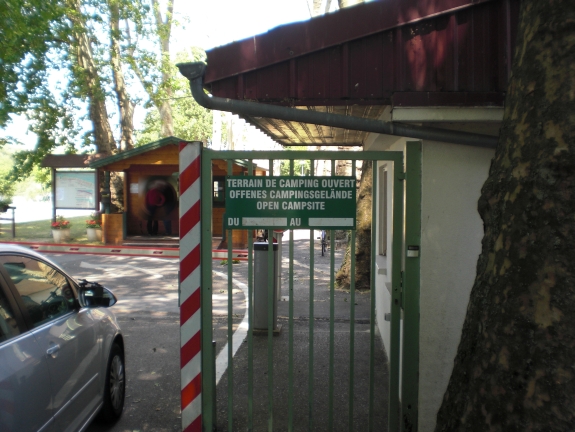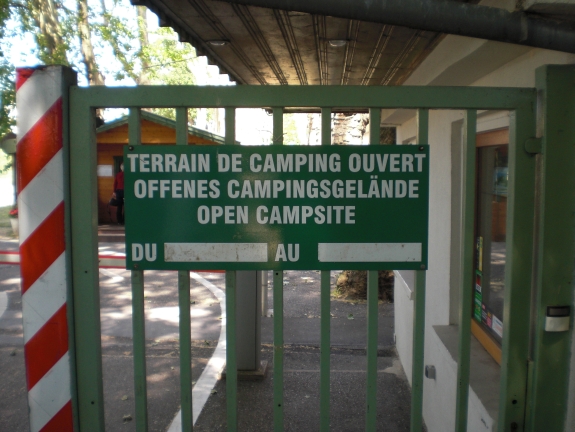Adjectives in front
Photos 29 May, German text 25 June, English translation
Photos
Above are two photos of the entry gate of the camp site at the Allée de Metz Plage in the French city of Metz.
Meaning?
I first read only the English and German texts, so I saw “Open Campsite” and “Offenes Campingsgelände”, and I wondered what they could mean. An open campsite. Let me think for a while. Is it a campsite without fences? Perhaps even free of charge? Especially suitable for motorhomes, cosily along the river Moselle?
French!
Only then I noticed the French version: “Terrain de Camping ouvert, du [no date mentioned] au [also no date]”.
Aha, then it is clear what it means! The campsite is not open all year, but only in the spring and summer months.
Or at least that possibility is kept open. But because there are no actual dates, perhaps the campsite is in fact open all year? That might make sense for a campsite close to a
touristically interesting
city. However, according to
this internet page
that is not the case. It says:
“Ouvert dès le 23 avril 2010 à 14h
(fermeture le 4 octobre à 14h)”.
So the correct translation should have been:
‘Campsite open
from [ ] to [ ]’
and in German:
‘Campinggelände geöffnet
von [ ] bis [ ]’
(or maybe better
‘Campingplatz’
instead of
‘Campinggelände’).
Background of the error
What could have caused these mistaken translations? (That is assuming they are really wrong; I could be mistaken myself, because neither English nor German is my native tongue; but in my own language too, ‘Open camping’ would not express the right idea.)
My assumption is that the text on the sign was written by a French(wo)man, who learned English and German in school pretty well. So he or she is aware that adjectives, which are most often after the corresponding nouns in Romance languages, must be put in front of them in Germanic languages.
Only here the rule was applied too rigorously, in a situation where it shouldn’t have been! The fact that a campsite is open, or opened, not closed, is not expressed by a preceding adjective, but by a shortened predicative sentence.
So:
‘The campsite is open from
[ ] to [ ].’
becomes
‘Campsite open from
[ ] to[ ]’.
Why this is so, I don’t know. Native speakers only know that it is how it is.
(And I know it or think I know, because in my own
language Dutch, it works the same as in English and German:
‘De camping is geopend van [ ] tot [ ].’
becomes
‘Camping geopend van [ ] tot [ ]’.)
Linking s?
Doesn’t the German word ‘Campinggelände’ sound better than “Campingsgelände”? Without a linking s? I do think so, again without knowing why.
But that’s not what this article is about.
Copyright of the
German original and this
English translation:
© 2011, R. Harmsen, all rights reserved.

